Key Competencies Kit
for Facing Lifelong Learning


 |
This Project has been funded with support from the European Commission. This communication reflects the views only of the author, and the Commission can not be held responsible for any use which may be made of the information contained therein. |
 |
Didactic Unit 5 |
Theme |
Time |
Be responsible |
|
3 hours |
|
||
|
||
|
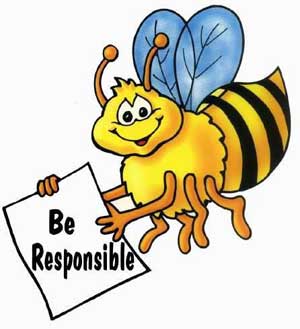
A responsible person is one who can act without guidance or supervision, because he or she is accountable and answerable for his or her behaviour.
Ideally, we've been taught responsibility, by our parents starting early in life. If we are lucky, we've been taught that every action has a consequence and that we need to do what we say we will do.
If you decided to strengthen your responsibility skills you should start from three fundamental things:
1. You should make a conscious effort and stop putting things off. Most people know when they are deliberately putting things off. This habit is the first thing on the list of a person who wants to avoid responsibility. When you notice that you are putting things off, make yourself do it.
2. Second important step on the way to responsible behaviour is knowing what your responsibilities are. Know exactly what needs to be done by you at work at home elsewhere.
3. Understand and accept the consequences. There are consequences to the things we do in life. It really is true that every our single action, be it positive or negative, has a consequence. If you drop out from school you will have bad education and have no chances to get well paid job. If you have borrowed money you will need to pay them back and if you can not do it you may loose your property and even go to jail. If you are constantly late for work, you might lose your job. If you often promise to do something and do not do it people will not trust you. It's easier to do the right thing (or not to do the wrong one) now and not have to deal with negative consequences later.
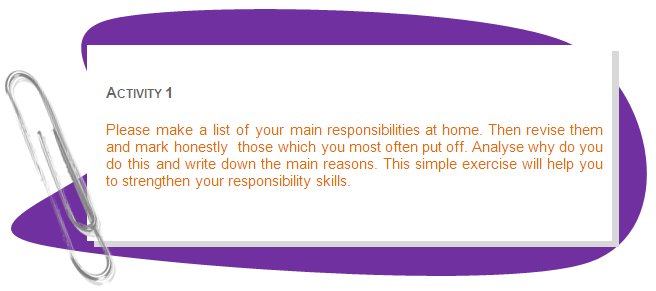
In this training module will focus on the following areas of responsible behaviour:
1. Set goals and priorities in balancing family life and work. There are no excuse for the situation when people have no time for their families and children because they “work hard”. Apart from the situation when people deliberately avoid family responsibilities there are three main reasons why work overshadow family so often:
Time management skills is at a core of balancing of family life and work. You can learn basics of time management in training module 5 (didactic unit 3).
Each person has an important place in his or her family or household. Neither the man nor the woman is more important than the other. They are equal partners and should work together to provide for the spiritual, emotional, intellectual, and physical needs of the family. Responsible people should understand that family requires not only material resources but also time and participation.
Responsible parents:
Essential responsibilities that parents must:
 |
Budgeting skills help to understand how much money you earn and spend over a period of time. When you create a budget, you are creating a plan for spending and saving money. |
Most important thing in responsible personal or family money management is to track your actual income and expenses.
How you can manage your money and avoid making debts if the amount of money coming in and out of your pocket is not known. Try to track you personal or family income and expenses during one month.
 |
A budget is nothing more than a breakdown and plan of how much money you have coming in and where it goes. |
Creating a budget is vital in keeping your financial house in order.
Here are daily money management steps
Before you begin to create your budget it is important to realize that in order to be successful you have to provide as much detailed information as possible. Ultimately, the end result will be able to show where your money is coming from, how much is there and where it is all going.
Use the following simple budget forms to help create a monthly or weekly budget. Once you have an estimate of how much you earn or spend in each of the categories listed (or create your own budget categories), try to create a monthly budget using the worksheets. Then during the month, track the items and see where you come in over or under budget.
CATEGORY |
MONTHLY BUDGET AMOUNT |
MONTHLY ACTUAL AMOUNT |
DIFFERENCE |
INCOME (by source) |
|
|
|
EXPENSES (fixed and variable): |
|
|
|
HOME (Mortgage or Rent, repairs...) |
|
|
|
UTILITIES |
|
|
|
FOOD |
|
|
|
FAMILY OBLIGATIONS: Child Support Alimony, Day Care ..... |
|
|
|
HEALTH |
|
|
|
TRANSPORTATION |
|
|
|
DEBT PAYMENTS |
|
|
|
CLOTHING |
|
|
|
ENTERTAINMENT/RECREATION |
|
|
|
MISCELLANEOUS |
|
|
|
Gather every financial statement you can. This includes any information regarding a source of income or expense.
Record all of your sources of income. If you are self-employed or have any outside sources of income be sure to record these as well. If your income is in the form of a regular pay-check where taxes are automatically deducted then using the net income, or take home pay, amount is fine. Record this total income as a monthly amount.
Create a list of monthly expenses. Write down a list of all the expected expenses you plan on incurring over the course of a month.
Break expenses into two categories: fixed and variable. Fixed expenses are those that stay relatively the same each month and are required parts of your way of living. They included expenses such as your mortgage or rent, and so on. These expenses for the most part are essential yet not likely to change in the budget. Variable expenses are the type that will change from month to month and include items such as food, cloths and other. This category will be important when making adjustments.
Total your monthly income and monthly expenses. If your end result shows more income than expenses you are off to a good start. This means you can prioritize this excess to areas of your budget such as education for you and your children, foe example. If higher expenses exceed income it means some changes will have to be made.
Make adjustments to expenses. If you have accurately identified and listed all of your expenses the ultimate goal would be to have your income and expense columns to be equal. This means all of your income is accounted for and budgeted for a specific expense. If you are in a situation where expenses are higher than income you should look at your variable expenses to find areas to cut.
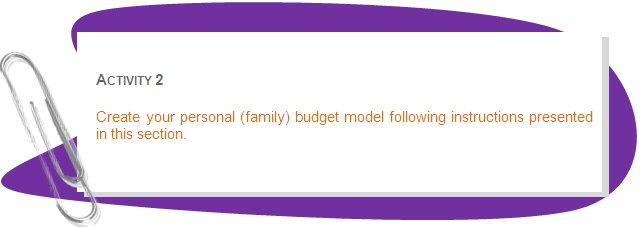
3. Contribute to community you live in. A community is a group of people with shared interests. Everyone is a member of at least one community, the community they live in. Whether you consider your community the people who live in your building, the people in your neighbourhood or the people in your town, you have a responsibility as a member of that community. This responsibility start from obeying rules of community life and respecting other people. Further, There many ways how to participate in the life of your community and many ways how to contribute to its well-being most important in this case is your positive perception of a community and willingness to do something.
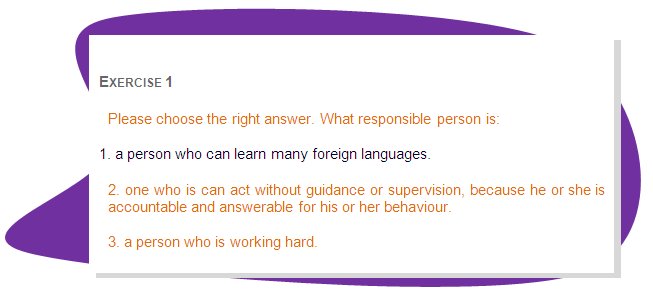
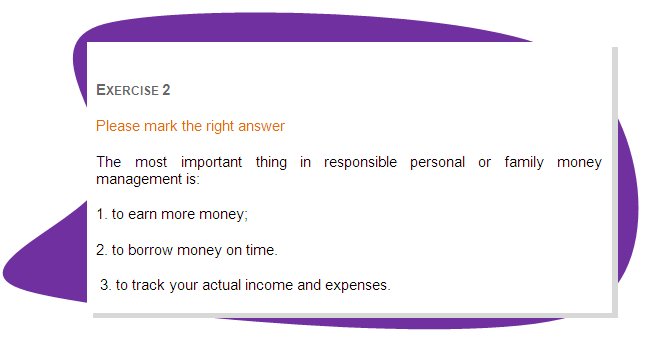
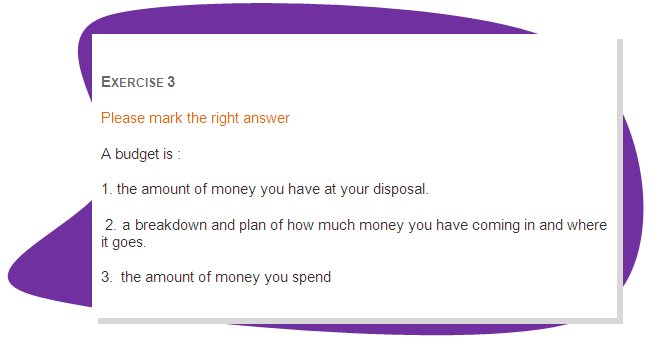
 |
Answers to the questions and exercises of Didactic Unit 5 |
1.
3
2